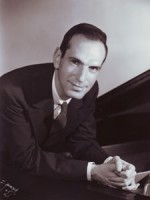Column Name
Title
Renowned pianist and teacher Joseph Bloch, a Juilliard faculty member for nearly five decades who influenced generations of pianists, died of a heart attack on March 4 at his home in Larchmont, N.Y. He was 91.
Body
“With an encyclopedic knowledge and a quick wit, his classes enthralled and educated his students as they learned of the rich environment that encompasses the world of the piano,” said Juilliard President Joseph W. Polisi. “His loss will be deeply felt by us all.”
Joseph Meyer Bloch was born in Indianapolis on November 6, 1917. While in high school, he studied with Bomar Cramer and later earned his B.M. from the Chicago Musical College. After serving in Guam during World War II, Bloch earned a master’s degree in musicology from Harvard, also commuting into New York to study with Olga Samaroff. He was head of the piano department at the University of Denver for two years before joining the Juilliard faculty in 1948.
He made his debut at Town Hall in 1950, earning special praise from New York Times critic Harold C. Schonberg for his interpretations of Hindemith and Bartok, which he called “thoroughly outstanding.” Over the years, he toured widely with numerous orchestras and as a recitalist in the U.S., Europe, and East Asia. He recorded for Pierian and for C.R.I. (Composers Recordings, Inc.), including works by American composers Benjamin Lees and Ruth Crawford Seeger.
Long before there was a residence hall or Student Affairs Office at Juilliard, Bloch’s piano literature classes fostered a sense of community—among the students in his classes and the piano community at large. A great enthusiast of music from around the world, he continually challenged and inspired his students to explore the complete range of piano music. For undergraduates, he taught a required two-year survey of the piano repertory. The classes he taught on the graduate level focused on more concentrated topics, from the well-known (Haydn sonatas or Chopin mazurkas) to the more obscure (Frescobaldi and Charles-Valentin Alkan, on whom Bloch wrote a monograph). In the early days of his teaching, when only a select few of Mozart’s concertos were performed in concert halls, he introduced students to the entire Mozart repertory. His insightful and expansive syllabi consequently contributed to the proliferation of Mozart’s music now presented regularly in performance. Another of Bloch’s most ardent campaigns was on behalf of Liszt, whom many pianists dismissed as flashy and bombastic. “He certainly underscored the fact that without Liszt, we wouldn’t have the great tone poems showing the way to the works of Richard Strauss,” Van Cliburn told Margalit Fox of The New York Times.
Bloch served as a learned guide to thousands of young pianists, among them well known performers such as Van Cliburn, Emanuel Ax, Garrick Ohlsson, Misha Dichter, Jeffrey Siegel, and Jeffrey Swann. Though Bloch retired briefly from Juilliard in the 1980s, he was persuaded to return and continued teaching until 1996, when he became faculty emeritus. He also taught at Indiana, Boston, and Temple Universities. An avid traveler, Bloch was a visiting professor at the University of Hong Kong, the Universities of Ontago and Aukland in New Zealand, the University of Singapore, and the Jerusalem Music Center in Israel, among others. He was the author of books on Alkan, Debussy, and Liszt, and co-authored (with Peter Coraggio) a book on Schubert, as well as writing a wide variety of scholarly articles.
A charming man with an elegant sense of humor, Bloch earned a reputation around the globe as a master teacher, graceful pianist, and phenomenal scholar. In 1985 he was named Chevalier de l’Ordre des Palmes Académiques by the French government. He received an honorary doctorate from Juilliard in 2004.
Bloch’s wife, Dana, whom he married in 1944, died last year. He is survived by a daughter, Leslie Gordon; two sons, John and Andrew; a sister, Frances Julian; and seven grandchildren.





